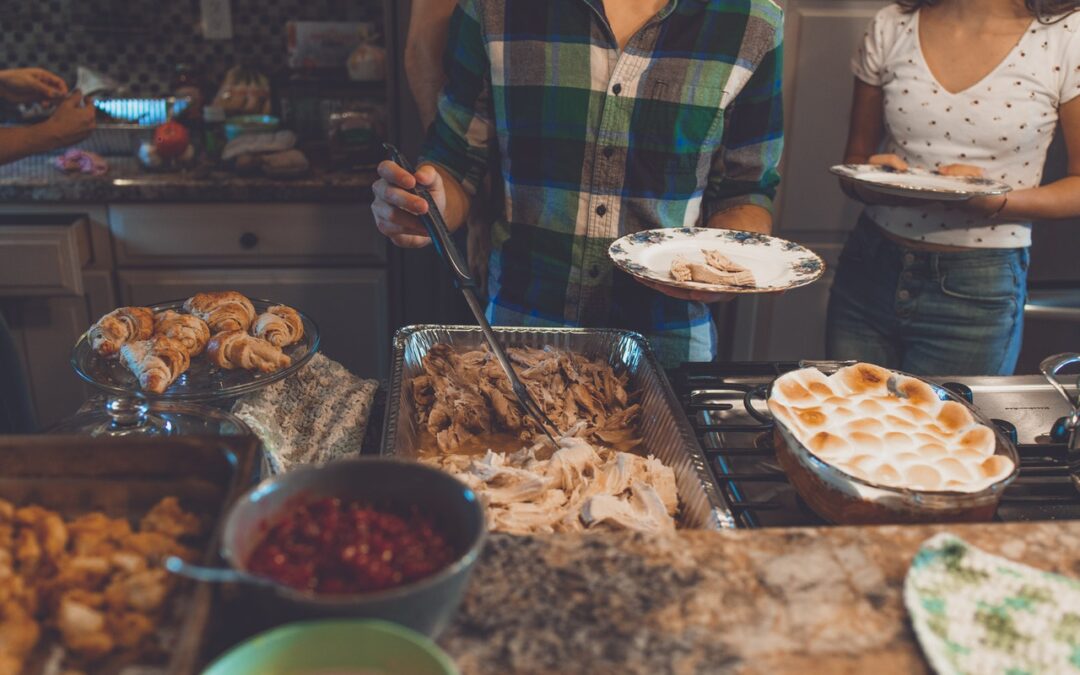Ahh, the holidays. A time when people gather together and share laughs, stories, embarrassing moments, and family traditions. While every family has unique traditions (anyone who has ever hidden a Christmas pickle knows just how unique families can get!), most holiday traditions have at least one thing in common: tasty food, and lots of it. There’s a reason why New Year’s resolutions almost always include losing weight. All that tasty food means that Americans gain, on average, 5 pounds between Thanksgiving and New Year’s Day. This wouldn’t be as bad if we stuck to our resolutions about losing weight, but gym memberships across the country reveal otherwise, showing a large drop-off in memberships around March of each year. Our resolutions aren’t lasting more than 3 months! Perhaps we need another tactic. Rather than accepting the inevitable holiday weight gain and promising to ourselves that we’ll burn it off in the new year, why don’t we work to avoid the weight gain in the first place? This not only allows us to better savor the food we eat, but also puts control back into our hands where we get to dictate how healthy we can be. Having power over our cravings, addictions, and habits, is the most self-rewarding experience. Having that power brings benefits that extend not only to our food choices but also to our lifestyle habits and personal goals. If you re-train your habits and beat back holiday weight gain, then you also have the skills to accomplish any goal you set your mind to.
Preventing Weight Gain Over The Holidays
So, how do you ward off weight gain over the holidays? Unfortunately, there are no easy tricks to overcoming engrained eating patterns or habitual snacking. As the saying goes, nothing worth having comes easy. There are, however, solid strategies that, if committed to, will prevent weight gain and even promote weight loss.
Eat Simply:
Holiday foods not only taste good but they make us want to eat more of it. These two aspects combined make holidays especially tempting times to overeat. What if we only chose one of those aspects and avoided the other? What if we ate foods that taste good but don’t make us want more of it? If this were the case, we’d be in a much better place and wouldn’t be taking in all those extra (and empty) calories. Plenty of foods taste wonderful but don’t lend themselves to overeating past the point of fullness. Seasoned, grilled vegetables, hearty soups and stews, and marinated steak or chicken are some examples of tasty food that doesn’t become addicting. Foods become addicting and easy to overeat when they contain:
- Sugar
- High fat
- High salt
- MSG
- Starch
Any food that uses the above list to create pleasing textures, aromas, or flavors is a food that makes us want more. If a food makes us want more, then we must avoid it. Focus instead on food that tastes good without wanting more. Try these strategies:
- Don’t add additional fat to your food. For the holidays, this means skipping the gravy on your turkey and avoiding extra butter in your mashed potatoes.
- Don’t add salt or seasonings to your food. It was already prepared with plenty of both so your taste buds won’t be left out!
- Reduce the variety of textures, flavors, and foods you eat. You don’t have to have a full serving of all the dishes. Choose a main dish and a couple of sides and stick with that.
Eat Less:
This ties in with the one above. If we are focusing on eating tasty food while avoiding foods that make us want to overeat, then we will automatically eat less. And the best part is that we won’t go hungry. We will be fully satiated by appropriate servings of tasty food because we’ll be eating foods that are nutrient-dense. Traditional holiday meals replace nutrient density with sugar, salt, starch, and all the other items on the list above. This is what makes us overeat. Instead, opt for extra vegetables and tubers (green beans, sweet potatoes, and mashed potatoes all come to mind for holiday meals). Adding extra protein (turkey or ham) will also boost nutrient density.
Chewing food thoroughly and eating slowly also lends itself to eating less. Increasing the number of chews per bite actually releases a gut hormone that signals the feeling of fullness. Secondly, our brain takes about 20 minutes to realize that you’re full, so eating slowly will allow your brain signals to catch up.
Move More:
The holidays are associated not only with eating and overeating but also with being generally sedentary. Especially among sports fans. Exercise can prevent weight gain by maintaining our sensitivity to leptin, the hormone that tells us we’re full (we want our bodies to pay attention to leptin!). Moving more during the holidays can be as simple as taking long walks after meals, adding in short workouts throughout the week, watching less TV, and standing whenever possible. If football simply must be watched, stand up whenever your team gets a touchdown (shouting and cheering encouraged), do squats or crunches whenever the opposing team scores, or take laps around the house during commercials.
Overeating doesn’t have to be the norm this holiday season. And eating tasty food doesn’t mean it has to be unhealthy. You can eat tasty food and not overeat at the same time. There are ways to thoroughly enjoy holiday meals while avoiding steadily rising numbers on your bathroom scale. Rather than going with the flow and accepting inevitable weight gain, let’s dedicate ourselves to preventing weight gain in the first place!

